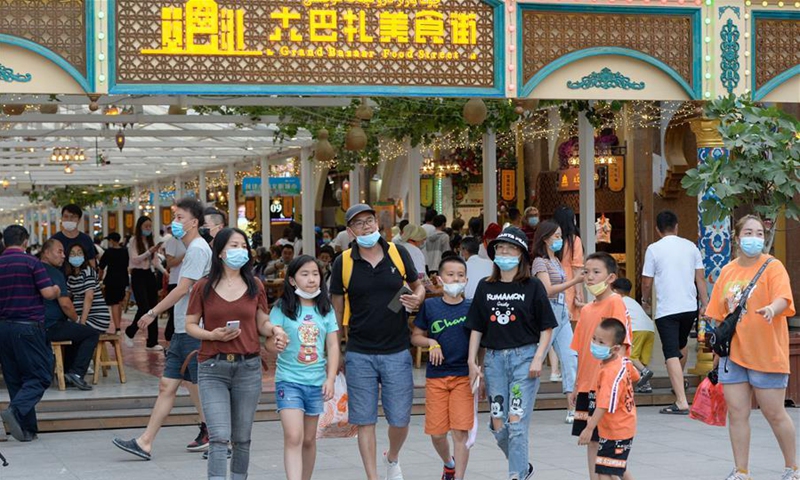Xinjiang tightened control after COVID-19 home cases revealed
Source: Global Times Published: 2020/7/17 11:21:36

Tourists visit the Grand Bazaar Food Street in Urumqi, capital of northwest China's Xinjiang Uygur Autonomous Region, July 4, 2020. (Xinhua/Ding Lei)
Xinjiang should take strict measures to curb the virus spread, prevent imported cases and strengthen testing in densely populated areas, Xinjiang's Party chief Chen Quanguo said on Thursday at a Party meeting after one symptomatic and three asymptomatic COVID-19 cases were reported in Urumqi, the capital of Northwest China's Xinjiang Uygur Autonomous Region.
Officials emphasized the need to tighten grid management in communities and rural areas across Xinjiang, and enhanced screening in fever clinics in region's hospitals.
Efforts should be also made to strengthen publicity, education and guidance on epidemic control and prevention, and respond to social concerns in a timely manner, officials stressed at the meeting.
Starting from Friday, Juneyao Air asked all passengers to and from Urumqi of Xinjiang to show negative nucleic acid test within seven days and make sure the health code is in safe status. Those who fail to meet the requirements will undergo a 14-day quarantine for medical observation.
As of Friday morning, flights to and from Urumqi had been largely canceled, with the cancellation rate at 89 percent.
The Changji Hui Autonomous Prefecture neighboring Urumqi announced on Friday that it will suspend all of its public bus operations, while all front-line workers will be required to take nucleic acid testing, and all vehicles thoroughly sterilized during the temporary suspension.
Jilin city's Fengman district in Northeast China's Jilin Province announced it will strengthen its health screening procedures for those coming to the city from Xinjiang since June 25, as new cases of COVID19 were reported in the region.
During the period of national regular epidemic prevention and control, sporadic cases are hardly evitable and there is no need for excessive panic, Chinese epidemic prevention expert Tao Lina told the Global Times on Friday. However, with unknown source and transmission route of the coronavirus, tightened control and extended screening are still significant as some asymptomatic infected ones are still at risk of transmission.
Tao said that it was necessary to compare the genetic sequencing results of the novel coronavirus from Beijing and Urumqi to determine whether the cases were related. "But because Xinjiang has a much smaller population density than Beijing, it should be relatively easy to control," said Tao.
Global Times
Posted in: SOCIETY